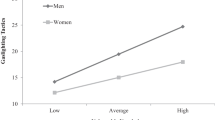Abstract
Results indicated that a female complainant was seen as less innocent and an accused male less guilty when they had previously been romantically involved. As a consequence, decision makers felt it was more appropriate to be lenient in responding to the accused. Also, as demonstrated in previous research, male and female decision makers differed in their judgments and responses to a complaint of sexual harassment. These results have implications for organizational policies concerning workplace romance and for training people to deal with complaints of sexual harassment.
Similar content being viewed by others
References
Anderson, C. I., & Hunsaker, P. L. (February, 1985). Why there's romancing at the office and why it's everybody's problem. Personnel, 62, 57–63.
Crull, P. (1982). Stress effects of sexual harassment on the job: Implications for counselling. American Journal of Orthopsychiatry, 52, 539–543.
Galen, M., Schiller, Z., Hamilton, J., & Hammonds, K. H. (1991, March). Ending sexual harassment: Business is getting the message. Business Week, 98–100.
Griffin, R., & Kacmar, K. M. (1991). Laboratory research in management: Misconceptions and missed opportunities. Journal of Organizational Behavior, 12, 301–311.
Jensen, I. W., & Gutek, B. A. (1982). Attributions and assignment of responsibility in sexual harassment. Journal of Social Issues, 38, 121–136.
Klemmack, S. H., & Klemmack, D. L. (1976). The social definition of rape. In M. J. Walker & S. L. Brodsky (Eds.), Sexual assault. Lexington, MA: D. C. Heath.
Livingston, J. A. (1982). Responses to sexual harassment on the job: Legal, organizational, and individual actions. Journal of Social Issues, 38, 5–22.
Mainiero, L. A. (1986). A review and analysis of power dynamics in organizational romances. Academy of Management Review, 11, 750–62.
Powell, G. N. (July-August, 1986). What do tomorrow's managers think about sexual intimacy in the workplace? Business Horizons, 29, 30–35.
Powell, G. N. (1988). Women & men in management. Newberry Park, CA: Sage.
Quinn, R. E. (1977). Coping with cupid: The formation, impact, and management of romantic relationships in organizations. Administrative Sciences Quarterly, 22, 30–45.
Quinn, R. E., & Lees, P. L. (1984). Attraction and harassment: Dynamics of sexual politics in the workplace. Organizational Dynamics, 13, 35–46.
Reilly, T., Carpenter, S., Dull, V., & Bartlett, K. (1982). The factorial survey: An approach to defining sexual harassment on campus. Journal of Social Issues, 38, 99–110.
Romance in the workplace: Corporate rules for the game of love. (June, 1984). Business Week.
Shaver, K. G. (1970). Defensive attribution: Effects of severity and relevance on the responsibility assigned for an accident. Journal of Personality and Social Psychology, 14, 101–113.
Shaw, J. I., & McMartin, J. A. (1977). Personal and situational determinants of attribution of responsibility for an accident. Human Relations, 30, 95–107.
Valentine-French, S., & Radtke, H. L. (1989). Attributions of responsibility for an incident of sexual harassment in a university setting. Sex Roles, 21, 545–555.
Weber-Burdin, E., & Rossi, P. H. (1982). Defining sexual harassment on campus: A replication and extension. Journal of Social Issues, 38, 111–120.
Woehr, D. J., & Lance, C. E. (1991). Paper people versus direct observation: An empirical examination of laboratory methodologies. Journal of Organizational Behavior, 12, 387–397.
Author information
Authors and Affiliations
Additional information
Partial support for this study was provided by a Saint Mary's Senate research grant. The authors thank an anonymous reviewer for the helpful comments on an earlier version of the paper.
Rights and permissions
About this article
Cite this article
Summers, R.J., Myklebust, K. The influence of a history of romance on judgments and responses to a complaint of sexual harassment. Sex Roles 27, 345–357 (1992). https://doi.org/10.1007/BF00289944
Issue Date:
DOI: https://doi.org/10.1007/BF00289944




